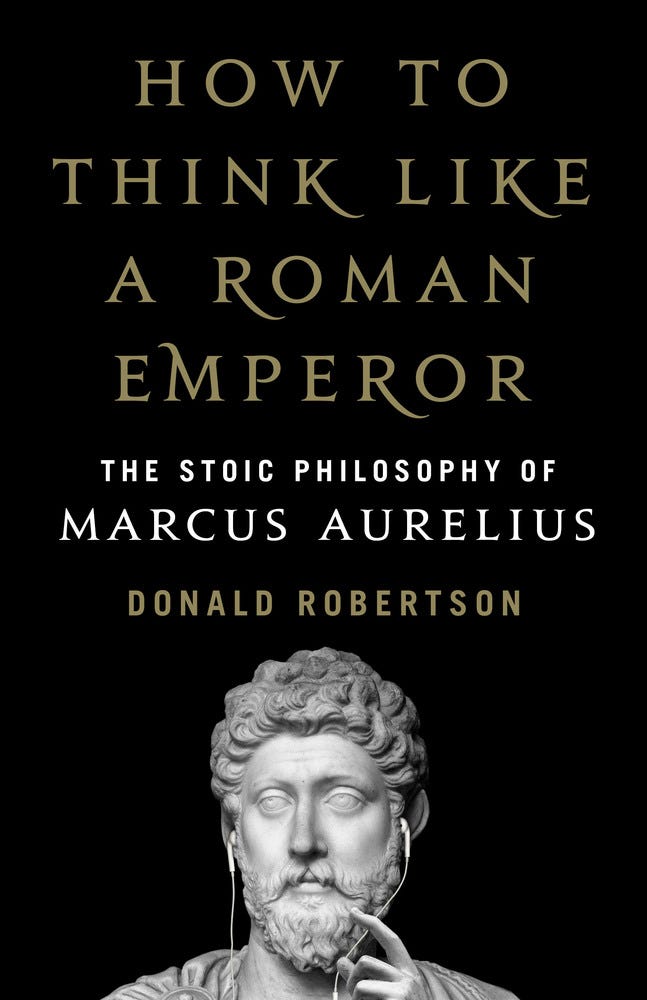What Makes Marcus Aurelius: The Stoic Emperor Different
How my new book is different from How to Think Like a Roman Emperor
Several people have asked me how my new book Marcus Aurelius: The Stoic Emperor (Yales) is different from How to Think Like a Roman Emperor (St Martin’s). I’ve written three books in row about Marcus Aurelius and they’re all very different. (The other one, Verissimus, is a graphic novel about his life.)
In a nutshell, Marcus Aurelius: The Stoic Emperor is a biography with a bit of philosophy and self-improvement advice; How to Think Like a Roman Emperor is a self-help book with a bit of philosophy and some biographical vignettes. Personally, I view them as very different books. I’ll try to explain some of the other differences below. By the way, Marcus Aurelius: The Stoic Emperor is already available to order in advance from Amazon and all other good booksellers. Please consider pre-ordering now if you’re interested as not only will you potentially benefit from Amazon’s pre-order price guarantee but by placing an advance order you help us get the book into more stores!
My hunch is that after reading How to Think Like a Roman Emperor, people will get a lot more out of Marcus Aurelius: The Stoic Emperor because it’s intended to help them put themselves much more into Marcus’ shoes, and immerse themselves in his world.
The biographical vignettes in How to Think Like a Roman Emperor are mainly intended to illustrate some of the philosophical and psychological points being made. Marcus Aurelius: The Stoic Emperor was written from a different perspective, with the goal of helping you to really get to know Marcus, in a more rounded way, as a human being. There’s also far more historical context, which is designed to help you deepen your understanding of Marcus’ character and actions.
There is a lot of Stoic philosophy in Marcus Aurelius: The Stoic Emperor. In fact, it contains about 100 references to the Meditations. The focus, though, is on how these help to explain Marcus’ character and actions as emperor, and his personal psychological journey. While I was writing the book, I also kept in mind that many readers would be looking for some self-improvement takeaways. So although this is not primarily a self-help book, I think there are general self-improvement themes which pervade the story, and which I hope readers will notice and take away. These may be subtle at times but I also think they can be more powerful for some readers because they’re more closely entwined with the story of Marcus’ life and the struggles he overcame.
The main self-improvement theme that I think we can observe in Marcus’ life is how he learned to master his own temper, and cope with anger. I believe that’s the most important area of self-help for most people today. Indeed, I like to say that anger is the royal road to self-improvement — or rather learning to overcome our anger is. You may notice that I say quite a lot about how Hadrian influenced Marcus. I believe that Emperor Hadrian, his adoptive grandfather, was, in a sense, as much of an influence on Marcus’ character as Emperor Antoninus, his adoptive father, was. Hadrian is barely mentioned in the Meditations, though, because his influence was that of a negative role-model — Marcus learned from him what not to do.
Description
Add this title to your Goodreads bookshelf.
This novel biography brings Marcus Aurelius (121–180 CE) to life for a new generation of readers by exploring the emperor’s fascinating psychological journey. Donald J. Robertson examines Marcus’s relationships with key figures in his life, such as his mother, Domitia Lucilla, and the emperor Hadrian, as well as his Stoic tutors. He draws extensively on Marcus’s own Meditations and correspondence, and he examines the emperor’s actions as detailed in the Augustan History and other ancient texts.
Marcus Aurelius struggled to reconcile his philosophy and moral values with the political pressures he faced as emperor at the height of Roman power. Robertson examines Marcus’s attitude toward slavery and the moral dilemma posed by capturing enemies in warfare; his attitude toward women; the role of Stoicism in shaping his response to the threat of civil war; the treatment of Christians under his rule; and the naming of his notorious son Commodus as his successor.
Throughout, the Meditations is used to shed light on the mind of the emperor—his character, values, and motives—as Robertson skillfully weaves together Marcus’s inner journey as a philosopher with the outer events of his life as a Roman emperor.
Table of Contents
Prologue: Truth in the Meditations
Chapter One. The Mother of Caesar
Chapter Two. Verissimus the Philosopher
Chapter Three. The Greek Training
Chapter Four. Hadrian’s Vendettas
Chapter Five. The Death of Hadrian
Chapter Six. Disciple of Antoninus
Chapter Seven. Disciple of Rusticus
Chapter Eight. The Two Emperors
Chapter Nine. The Parthian Invasion
Chapter Ten. The War of Lucius Verus
Chapter Eleven. Parthicus Maximus
Chapter Twelve. The Antonine Plague
Chapter Thirteen. The War of Many Nations
Chapter Fourteen. Germanicus
Chapter Fifteen. Sarmaticus
Chapter Sixteen. Cassius the Usurper
Chapter Seventeen. The Civil War
Chapter Eighteen. The Setting Sun
Epilogue: The Hall of Mysteries







